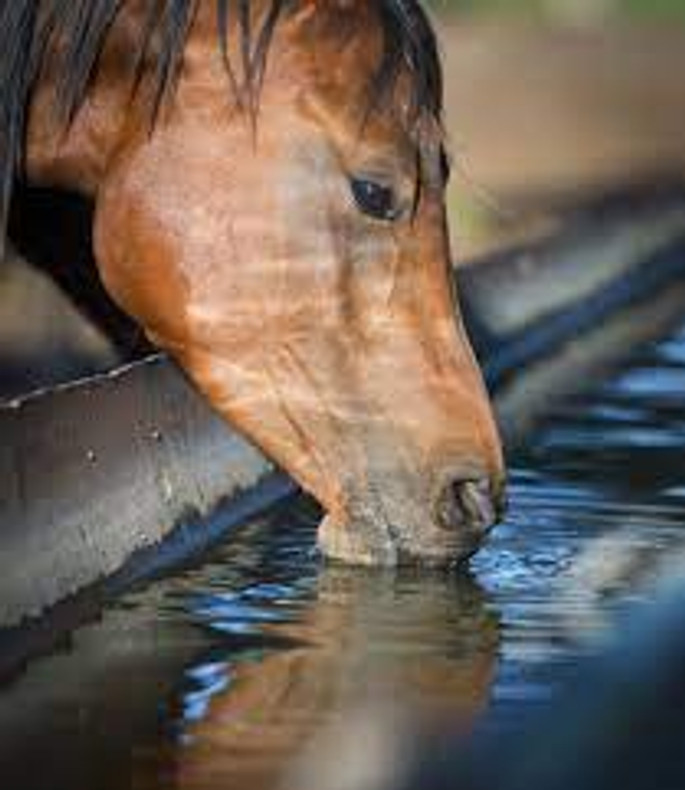Keeping horses hydrated is a year-round duty, however, the risk of dehydration is certainly elevated during the hot summer months. In todays blog post we talk about ways to monitor hydration, prevent dehydration and some other handy considerations all horse owners should check this summer!
How do I check if my horse may be dehydrated?
Skin pinch test
A skin pinch test is the quickest and easiest way to check your horse’s hydration. The skin has an elastic state when well hydrated. This is tested by pinching the skin between your thumb and forefinger, near the point of shoulder on the horse. The skin, if hydrated, will return flat in less than a second. If they are moderately dehydrated this may take between 2-4 seconds, and anything greater is severely dehydrated.
Capillary Refill Time
This is tested on the horses’ gums. The gums should present pink and moist. Press your thumb on the upper gum for a second, turning the point light pink. Upon release, the point should return to pink within the second. A longer reaction time may be an indication of dehydration
Overall appearance and behaviour
Has your horse eaten? A horse won’t eat if it hasn’t drunk, so this could be signaling dehydration.
Does your horse appear alert? Signs of tiredness, weariness even some stiffness moving, may be indicating dehydration.
Does your horse appear ‘tucked up’? Drawn up flanks are a sign that the horse has not drunk recently and may be an early warning sign of dehydration.
What can I do to prevent/treat dehydration?
As a horse becomes dehydrated, the salt concentration in their blood decreases, and ultimately reduces their thirst reflex. Thus, it is most important to stimulate the horses thirst reflex, in order to promote their re-hydration. This can be done in a number of ways
- Feed an electrolyte or salt daily.
- Ranvet Electrolyte Replacer or Salkavite are ideal products to both increase sodium and chloride (salt) levels, and replenish soluble vitamins, such as B group Vitamins, lost in sweat
- Provide an Electrolyte Paste after exercise or travel, to provide a concentrated dose after these significant loses
- If reluctant to drink, sweeten the taste and smell of the water with molasses, cordial or even melted licorice
- Use a Drench gun to administer water straight over the tongue – useful for a horse refusing to drink
If concerned or you fear that your horse is suffering from moderate to severe dehydration, contact your vet immediately.
Daily Check Ups
A horse will consume between 20L and 60L per day, but there are various reasons that may deter a horse from meeting this requirement just with the water itself! We suggest checking on and considering the following
- Does your horse know where the water is?
It may sound silly, but if you are moving paddocks or introducing your horse to a new area take a minute to walk them to the water source and show them!
- Is there enough water?
For automatic waterers this question may relate to a tank, if it is not connected to a “town” supply. Check daily that the automatic waterer is refilling and in operation, with no leaks.
For buckets or bins, check that the capacity is greater than 60L. Consider how many horses will be using it, will you be at the paddock to check and refill again tomorrow? These questions will help determine how much water you will need as a minimum.
- Is the water clean?
Water can be tainted by various things from animal feces to leaves/fruits off trees. Different contaminants cannot only give off a deterring smell, but a bad taste. Check daily and refill with clean water where/when possible. Taking a scrubbing brush will also help remove any algae buildup.
- How is the water temperature?
In winter we may find ourselves breaking open frozen water troughs but what about on hot days? Is your water source in the full sun? Are the pipes connecting to it in the full sun? Warm to hot water will deter the horses from drinking as their sensitive muzzles will react negatively to the unexpected temperatures. On hot days consider refilling water in the afternoon to replace the warm water, with cool water.


